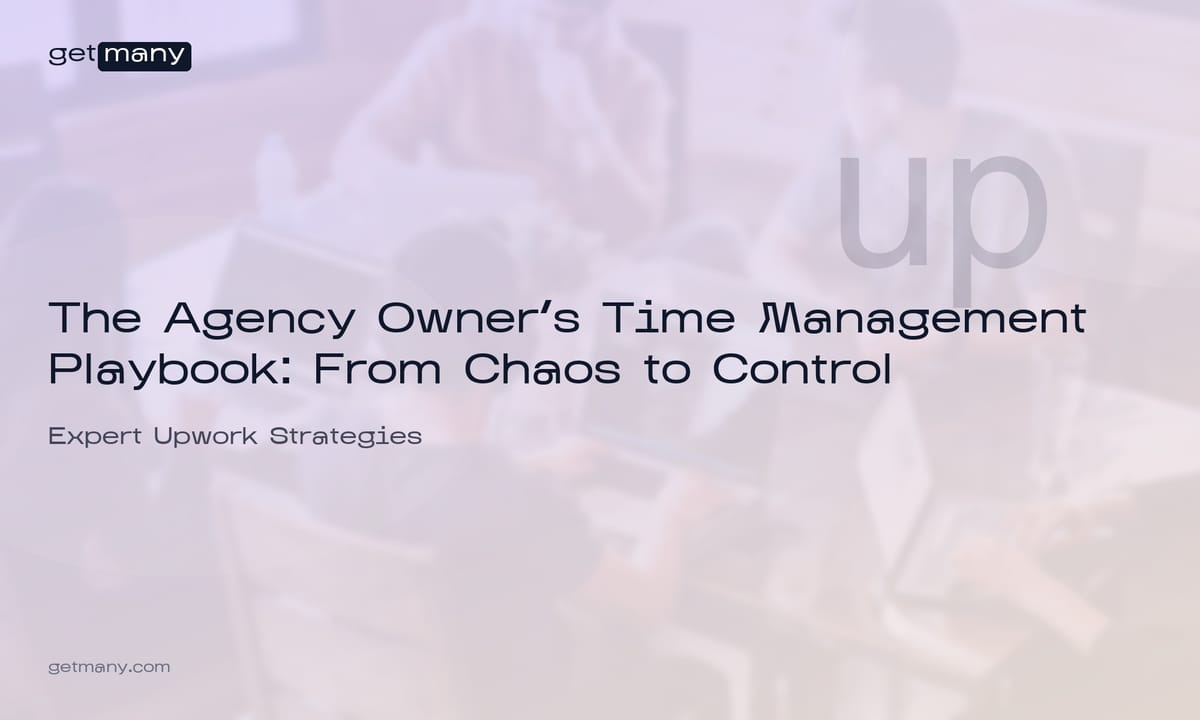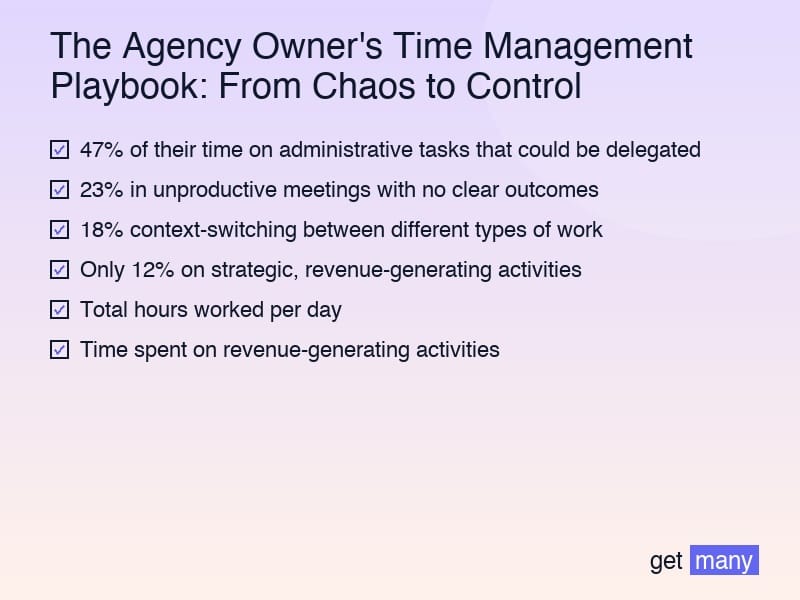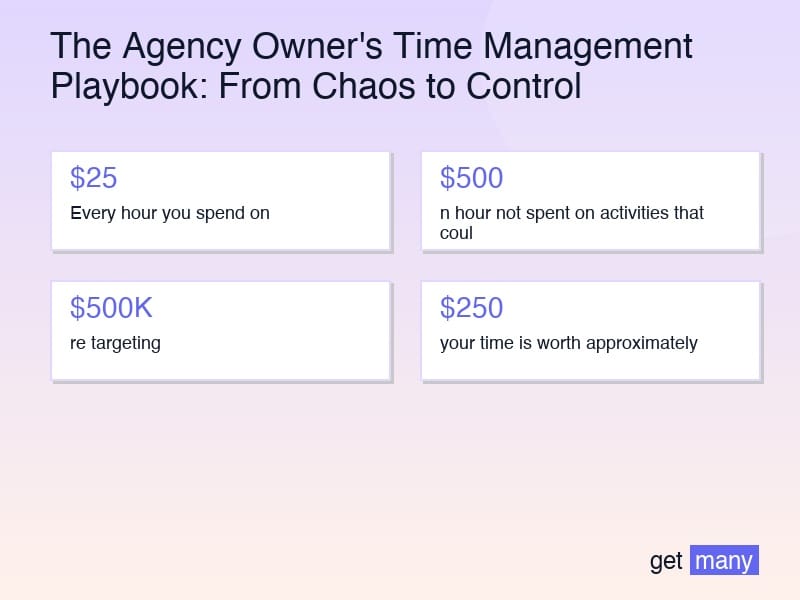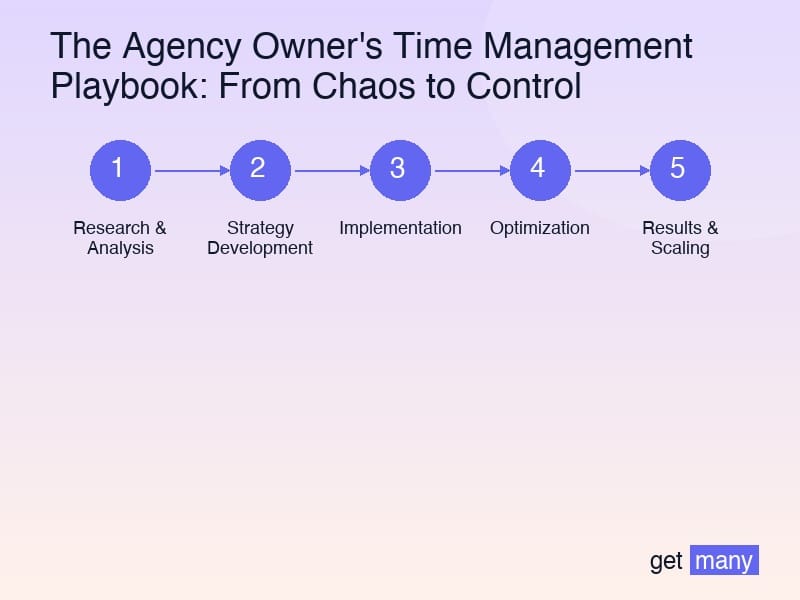The Agency Owner's Time Management Playbook: From Chaos to Control
Master the time management systems that separate successful agency owners from those trapped in operational chaos. Data-driven strategies to reclaim your calendar.

You built your agency to create freedom, not to become its prisoner. Yet here you are: drowning in Slack notifications, jumping between client calls, and wondering where your 12-hour day disappeared. The harsh truth? Most agency owners are terrible at time management, and it's killing their growth potential.
After analyzing productivity data from 200+ Upwork agencies, I've identified the exact systems that separate the chaos-driven owners from those who've achieved true operational control. The difference isn't talent or luck—it's ruthless time management discipline.
The Hidden Cost of Poor Time Management

Before diving into solutions, let's quantify the problem. The average agency owner spends:
- 47% of their time on administrative tasks that could be delegated
- 23% in unproductive meetings with no clear outcomes
- 18% context-switching between different types of work
- Only 12% on strategic, revenue-generating activities
This isn't just inefficient—it's financially devastating. Every hour you spend on $25/hour tasks is an hour not spent on activities that could generate $500+ in business value.
The Pyramid of Time Management Mastery

Effective time management for agency owners follows a clear hierarchy. Master each level before moving to the next:
Level 1: Time Awareness (Foundation)
Most owners operate in time blindness. They have no idea where their hours actually go. Start with ruthless time tracking for two weeks. Use tools like RescueTime or Toggl to capture every activity.
Key metrics to track:
- Total hours worked per day
- Time spent on revenue-generating activities
- Context-switching frequency
- Interruption patterns
Level 2: Energy Management (Amplification)
Time is finite, but energy is renewable. Map your energy patterns throughout the day. Are you sharp in the morning? Creative in the afternoon? Use this data to align your most important work with your peak energy windows.
Energy audit questions:
- When do you feel most mentally sharp?
- What activities drain your energy fastest?
- How does your energy change throughout the week?
Level 3: Priority Filtering (Focus)
Not all tasks are created equal. Implement the Eisenhower Matrix specifically for agency work:
Urgent + Important: Client emergencies, critical deadlines Important + Not Urgent: Strategic planning, business development Urgent + Not Important: Most meetings, administrative tasks Neither: Social media browsing, unnecessary perfectionism
Level 4: Systems and Automation (Leverage)
The highest-performing agency owners don't just manage time—they eliminate time waste through systems. This is where tools like Getmany become invaluable for automating proposal writing and client acquisition.
The Agency Owner's Daily Operating System

Here's the exact framework I use to maintain control over my calendar and focus on high-value activities:
Morning Block (6:00-9:00 AM): Strategic Deep Work
Reserve your first three hours for your most important work. No meetings, no emails, no interruptions. This is when you tackle:
- Strategic planning sessions
- New business development
- Complex problem-solving
- Creative work requiring deep focus
Mid-Morning Block (9:00-12:00 PM): Client Communication
Handle all client communication in batches. Respond to emails, take calls, and address urgent client matters. The key is containment—don't let client communication bleed into your deep work time.
Afternoon Block (1:00-4:00 PM): Operations and Team Management
Use post-lunch hours for operational work:
- Team meetings and one-on-ones
- Process improvement sessions
- Administrative tasks
- Proposal reviews
Late Afternoon (4:00-6:00 PM): Learning and Development
Invest in your future self. This time is for:
- Industry research and trend analysis
- Skill development
- Strategic planning
- Networking and relationship building
The Delegation Decision Framework
Most agency owners struggle with delegation because they lack a clear framework for deciding what to delegate and when. Use this systematic approach:
The $500 Rule
Calculate your true hourly value based on your annual revenue goals. If you're targeting $500K annually, your time is worth approximately $250 per hour. Any task that doesn't generate or protect at least $250 in value should be delegated.
The Expertise Gradient
Map every task in your business on an expertise scale:
- Level 1: Basic administrative work (data entry, scheduling)
- Level 2: Skilled operational work (proposal writing, client onboarding)
- Level 3: Strategic work requiring deep business knowledge
- Level 4: Vision-level work only you can do
Delegate everything below Level 3 as quickly as possible.
The Documentation Test
Before delegating, ask: "Can this be turned into a repeatable process?" If yes, document it and delegate. If no, consider whether it's actually necessary work.
Technology Stack for Time Management
The right tools can multiply your time management efforts. Here's my battle-tested stack:
Calendar Management
- Google Calendar with color-coding for different work types
- Calendly for automated scheduling
- Time-blocking for all major activities
Communication Management
- Slack with strict "do not disturb" hours
- Loom for asynchronous video communication
- Email templates for common responses
Project Management
- Monday.com or Asana for team coordination
- Notion for documentation and knowledge management
- Getmany for automated Upwork proposal generation
Focus and Productivity
- Forest or Cold Turkey for distraction blocking
- RescueTime for time tracking
- Toggl for project-specific time allocation
The Weekly Review System
Sustainable time management requires regular system maintenance. Implement this weekly review process:
Friday Wind-Down (30 minutes)
- Review time logs from the week
- Identify your biggest time wasters
- Assess progress on strategic priorities
- Plan improvements for the following week
Sunday Planning (45 minutes)
- Set three strategic priorities for the week
- Time-block your calendar for deep work
- Prepare for high-stakes meetings
- Review and adjust your delegation pipeline
Common Time Management Traps (and How to Avoid Them)
The "I'll Do It Faster Myself" Trap
This is the most expensive mindset in agency ownership. Yes, you can write a proposal faster than training someone else to do it. But while you're writing proposals, you're not closing new clients or improving your systems.
Solution: Embrace the 3x rule. If a task takes you 1 hour, budget 3 hours to train someone else. This investment pays dividends forever.
The "Always Available" Trap
Clients don't respect boundaries they can't see. If you're always available, you train clients to expect immediate responses, creating a cycle of constant interruption.
Solution: Set clear communication boundaries. Establish specific hours for client communication and stick to them religiously.
The "Meeting Default" Trap
Most meetings are status updates disguised as collaboration. They're the enemy of deep work and strategic thinking.
Solution: Implement a "no meeting" policy for certain days or times. For necessary meetings, require agendas and clear outcomes.
Advanced Time Management Strategies
Energy-Based Scheduling
Track your energy levels throughout the day for two weeks. Then schedule your most important work during your peak energy windows and routine tasks during low-energy periods.
The 90-Minute Rule
Research shows that focused work sessions should align with your natural attention cycles. Work in 90-minute blocks followed by 15-20 minute breaks.
Attention Residue Management
When you switch between tasks, part of your attention remains stuck on the previous task. Minimize this by:
- Batching similar tasks together
- Using transition rituals between work blocks
- Taking brief breaks between different types of work
Measuring Time Management Success
Track these key metrics to ensure your time management system is working:
Efficiency Metrics
- Percentage of time spent on high-value activities
- Average time between task switching
- Number of interruptions per day
- Completion rate of planned tasks
Business Impact Metrics
- Revenue per hour worked
- Client acquisition cost
- Time to deliver projects
- Team productivity improvements
Personal Satisfaction Metrics
- Stress levels throughout the day
- Work-life balance satisfaction
- Energy levels at end of workday
- Overall job satisfaction
The Getmany Advantage: Automated Time Savings
One of the biggest time drains for agency owners is proposal writing. The average proposal takes 45 minutes to write, and most agencies submit 20-30 proposals per month. That's 15-22 hours of your time consumed by a task that can be automated.
Getmany transforms this process by:
- Automatically finding relevant job postings
- Generating personalized proposals at scale
- Learning from your successful proposals
- Freeing up 20+ hours per month for strategic work
This isn't just about efficiency—it's about reclaiming your role as a strategic leader instead of a proposal writer.
Your 30-Day Time Management Transformation
Week 1: Assessment and Awareness
- Track every hour for seven days
- Identify your peak energy periods
- Audit your current delegation practices
- Set up your basic technology stack
Week 2: System Implementation
- Implement time-blocking for all major activities
- Create your first delegation pipeline
- Establish clear communication boundaries
- Begin using focus management tools
Week 3: Optimization and Refinement
- Analyze your time tracking data
- Optimize your daily schedule based on energy patterns
- Expand your delegation efforts
- Implement weekly review sessions
Week 4: Advanced Techniques
- Experiment with 90-minute work blocks
- Implement attention residue management
- Set up advanced automation tools
- Create measurement systems for ongoing improvement
The Bottom Line
Time management for agency owners isn't about cramming more work into your day—it's about ensuring you're working on the right things at the right times. The goal is to transition from being trapped in your business to leading it strategically.
The agencies that scale successfully aren't the ones with the most talented owners—they're the ones with owners who've mastered the art of time leverage. They understand that every hour spent on low-value tasks is an hour stolen from building the business they dreamed of.
Start with the basics: track your time, understand your energy patterns, and begin delegating systematically. Then layer in the advanced techniques and tools that multiply your effectiveness.
Your future self will thank you for the investment in systems that free you to focus on what only you can do: vision, strategy, and growth.
Ready to reclaim your calendar and accelerate your agency's growth? Getmany's automation tools can immediately free up 20+ hours per month by handling your proposal writing and client acquisition. Start your transformation today and focus on what truly matters: building the agency of your dreams.





